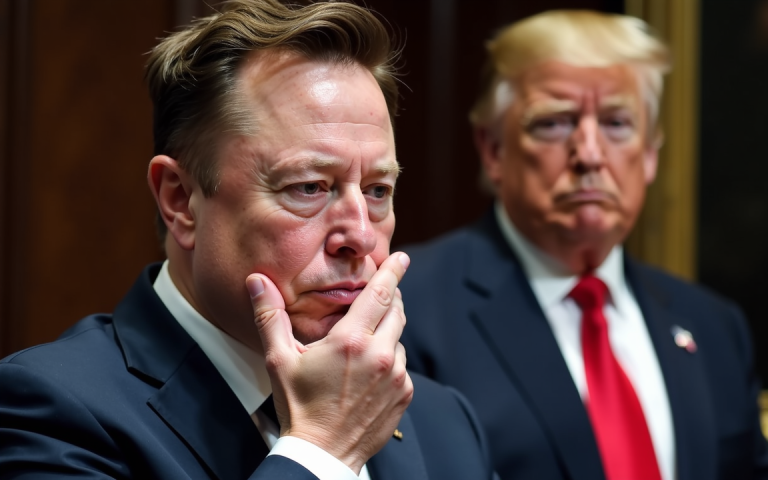In a digital world where alliances can shift as quickly as a viral tweet, tech visionary Elon Musk found himself in an uncharacteristic position on Wednesday: expressing public regret.
The target of his digital mea culpa? None other than US President Donald Trump, a figure with whom Musk had, until very recently, shared a notably close and strategically significant partnership.
This rare admission of regret from the often-unflinching billionaire signaled a potential, if tentative, de-escalation in an explosive public feud that had captivated onlookers and rattled market nerves.
The preceding week had been nothing short of a political soap opera.
A once-tight bond, which saw Musk appointed to spearhead the ambitious, budget-slashing Department of Government Efficiency (DOGE) under Trump’s second term, had spectacularly imploded.
The fallout left investors and political commentators alike anxiously pondering the future trajectory of Musk’s sprawling empire, particularly his flagship companies, Tesla and SpaceX.
Then came Musk’s concise, yet loaded, statement on his X social media platform: “I regret some of my posts about President @realDonaldTrump last week. They went too far.”
I regret some of my posts about President @realDonaldTrump last week. They went too far.
The spark: a ‘disgusting abomination’ and White House retribution
The fuse for this public detonation was lit by Musk’s fiery denunciation of the Trump administration’s proposed spending bill.
This sprawling piece of legislation, a cornerstone of Trump’s domestic agenda, was met with Musk’s unvarnished scorn.
He didn’t just disagree; he labeled it a “disgusting abomination” and, in a move that many saw as crossing a political Rubicon, urged for political retribution against any Republican lawmakers who dared to support it.
Such a direct challenge, especially from a figure of Musk’s stature and influence, was never going to pass unnoticed within the fortified walls of the White House.
And notice, they did.
Following the heated drama, President Trump, who is never one to shy away from a public confrontation, delivered a stern counterpunch during an NBC News interview on Saturday.
He warned Musk of “very serious consequences” if the billionaire actually acted on his apparent threat to bankroll primary challengers against incumbent Republican lawmakers who had backed the contentious bill.
“He’ll have to pay very serious consequences if he does that,” Trump declared, his words carrying an air of ominous ambiguity as he declined to specify what form these consequences might take.
Any hope of a swift reconciliation was decisively quashed when the President added, with characteristic bluntness, “I have no intention of speaking to him.”
The acrimony was a dizzying reversal from the public bonhomie of just a week prior.
Trump had then been lauding Musk’s service as the head of DOGE, an advisory body conceived to inject a dose of Musk’s famed efficiency into the sprawling federal bureaucracy.
But Musk had abruptly stepped down, citing deep-seated disagreements over the fundamental direction of government spending.
It was a move that, in retrospect, served as the prelude to his open, scathing criticism of the President’s signature legislation.
Musk’s initial critical posts online had triggered an immediate and forceful pushback from the administration.
This further culminated in Trump accusing his former ally of ingratitude and, perhaps more alarmingly for Musk’s shareholders, threatening a review of lucrative federal contracts awarded to his companies.
The Epstein gambit: an incendiary claim, a swift deletion, and lingering questions
The already white-hot tensions between the two titans then escalated to a near inferno.
Musk, in a series of posts that sent shockwaves across the internet, directly linked President Trump to the deceased and disgraced financier Jeffrey Epstein, who had died by suicide in federal custody in 2019 while awaiting trial on sex trafficking charges.
“Time to drop the really big bomb: (Trump) is in the Epstein files,” Musk typed into the digital ether, alluding to unreleased government documents rumored to detail Epstein’s extensive network of high-profile associates.
He didn’t stop there.
Musk further alleged that these supposed documents were being deliberately suppressed, hinting that they might contain politically damaging information about the President himself.
Musk offered no shred of evidence to back this explosive claim, nor did he specify which “files” he was referencing.
In a tantalizing follow-up, he urged his millions of followers to “mark this post for the future,” cryptically adding, “The truth will come out.”
The digital bombshell, however, had a remarkably short fuse.
By Saturday morning, both incendiary posts had vanished from Musk’s X account, deleted without a word of explanation, leaving a void filled with speculation and unanswered questions.
President Trump, when confronted with Musk’s allegations by NBC, brushed them aside as “old news.”
“Even Epstein’s lawyer said I had nothing to do with it,” he retorted.
It’s a matter of public record that President Trump has acknowledged knowing Epstein socially in the past, but he has consistently and vehemently denied ever visiting Epstein’s notorious private island or participating in any illegal activity.
Crucially, publicly released documents pertaining to the Epstein case do not accuse the President of any wrongdoing.
Musk’s subsequent deletion of the posts, followed by his midweek expression of regret, now suggests a calculated attempt to dial back the intensity of the confrontation.
Whether this signals a genuine desire for rapprochement, a strategic retreat in the face of presidential power, or simply Muskian unpredictability, remains to be seen.
The digital dust may be settling, but the underlying rifts in this high-stakes relationship may well linger, casting a long shadow over the intersection of tech, politics, and power.
The post After Epstein ‘bomb’ & Trump’s wrath, Elon Musk admits he ‘went too far’ in feud appeared first on Invezz

